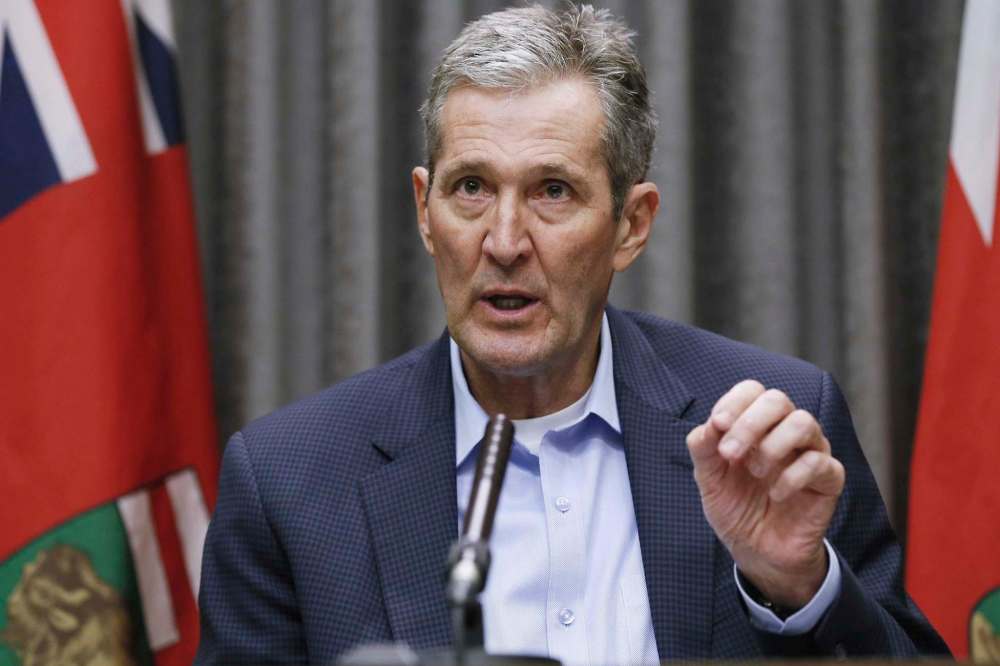Province offers loans of up to $6,000 for businesses not getting help from Ottawa
Read this article for free:
or
Already have an account? Log in here »
To continue reading, please subscribe:
Monthly Digital Subscription
$0 for the first 4 weeks*
- Enjoy unlimited reading on winnipegfreepress.com
- Read the E-Edition, our digital replica newspaper
- Access News Break, our award-winning app
- Play interactive puzzles
*No charge for 4 weeks then price increases to the regular rate of $19.00 plus GST every four weeks. Offer available to new and qualified returning subscribers only. Cancel any time.
Monthly Digital Subscription
$4.75/week*
- Enjoy unlimited reading on winnipegfreepress.com
- Read the E-Edition, our digital replica newspaper
- Access News Break, our award-winning app
- Play interactive puzzles
*Billed as $19 plus GST every four weeks. Cancel any time.
To continue reading, please subscribe:
Add Free Press access to your Brandon Sun subscription for only an additional
$1 for the first 4 weeks*
*Your next subscription payment will increase by $1.00 and you will be charged $16.99 plus GST for four weeks. After four weeks, your payment will increase to $23.99 plus GST every four weeks.
Read unlimited articles for free today:
or
Already have an account? Log in here »
Hey there, time traveller!
This article was published 22/04/2020 (2061 days ago), so information in it may no longer be current.
Small and medium-sized businesses can now apply to the province for a short-term loan to supplement revenues lost to government restrictions brought on by the novel coronavirus.
Up to $120 million in provincial funding has been earmarked for businesses that don’t qualify for programs offered by the federal government through the Manitoba Gap Protection Program.
Business owners can apply for the “non-interest bearing” loan valued at up to $6,000, which would be forgiven at the end of the year if the business doesn’t receive major non-repayable COVID-19 support from the federal government.

“It’s not enough. I wish we could do more,” Premier Brian Pallister said during a media briefing Wednesday morning. “Our priority is to do what we can to help businesses get through this valley, and we’re doing everything we can to do that.”
The program will provide a cash injection for start-up operations that do not demonstrate revenue losses, or companies with payrolls not high enough to meet the requirements of the federal government’s wage-subsidy program, he said. Businesses that have accessed funds through the Canada Emergency Wage Subsidy, the Canada Emergency Business Account, or sector-specific federal grant programs may not be eligible.
“The idea here again is not to duplicate, but rather to complement and fill the gaps that are there as a result of the design of the federal program,” Pallister said.
Manitoba Chambers of Commerce president Chuck Davidson said business owners had been waiting for the provincial government to step up with support, and called the Manitoba Gap Protection Plan a move in the right direction.
“What we’ve really been asking for is for programs that are going to put dollars in the pockets of businesses right now, many of which have been without revenue for up to six weeks, but at the same time do have expenses,” Davidson said.
“This will help, but it’s not going to make them whole by any means,” he added. “I think the sooner that we can start talking recovery, the better, but before we can talk recovery we need to stabilize business and this will help to stabilize the business community.”
The province anticipates about 20,000 businesses will be eligible for the MGPP loan. If demand for the program exceeds the $120 million set aside, the government will consider offering more, Pallister said.

The province said the loan would be added to a business’s 2020 tax bills, however, if they accept benefits under a federal COVID-19 support program. Few other details on the terms of the loan or eligibility criteria were made available Wednesday.
Jonathan Alward, director for the Prairie region for the Canadian Federation of Independent Business, said the second-greatest pressure brought on by restrictions related to the novel coronavirus continues to be commercial rent. The national average rent paid by commercial tenants is $10,000 a month, he noted, with some Manitoba operations skewing slightly lower.
Last week, Prime Minister Justin Trudeau announced the Canada Emergency Commercial Rent Assistance Program, which would provide loans to commercial property owners who lower or waive rent for small businesses for the months of April, May, and June. The provincial government has committed $16 million to the federal program, which has yet to come online.
“How that is ultimately rolled out, who is able to qualify and how much is going to be needed for different kinds of businesses, that for me is a big question mark in terms of what additional measures are going to be needed,” Alward said.
“There’s no shortage of examples where business owners need some extra help, and I think this is a good step to help address some of those gaps,” Alward said. “The $6,000 will help but it’s not going to be a solution.”
Manitoba NDP Opposition leader Wab Kinew said the loan program fails to address immediate challenges for business owners and raised concerns over the exclusionary criteria.
“Every week that goes by that we don’t see something really substantive to help the business owners out there, the more job losses we’re going to risk, and the more this recession is going to worsen,” Kinew said. “I think there’s a danger here that there’s too many strings attached across the board and the net result would be that the quick and easy assistance never happens.”
Pallister said he will be releasing details of the province’s plan to get the economy “back on track” — which is in the final stages of development — next week.
— with files from Malak Abas
danielle.dasilva@freepress.mb.ca
To be eligible for the Manitoba Gap Protection Program:
- A business must have been operational on March 20
- Have temporarily ceased or reduced operations because of COVID-19 public-health orders and have been harmed by the orders
- Be registered and in good standing with the Manitoba Business and Corporate Registry
- Have not qualified for federal government support
- Have an email address and a bank account
— Government of Manitoba

Our newsroom depends on a growing audience of readers to power our journalism. If you are not a paid reader, please consider becoming a subscriber.
Our newsroom depends on its audience of readers to power our journalism. Thank you for your support.
History
Updated on Wednesday, April 22, 2020 5:15 PM CDT: full write-thru, additional formatting





